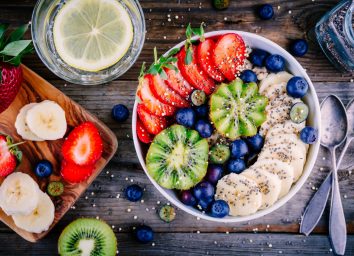The #1 Best Breakfast for Your Immunity, Says Dietitian
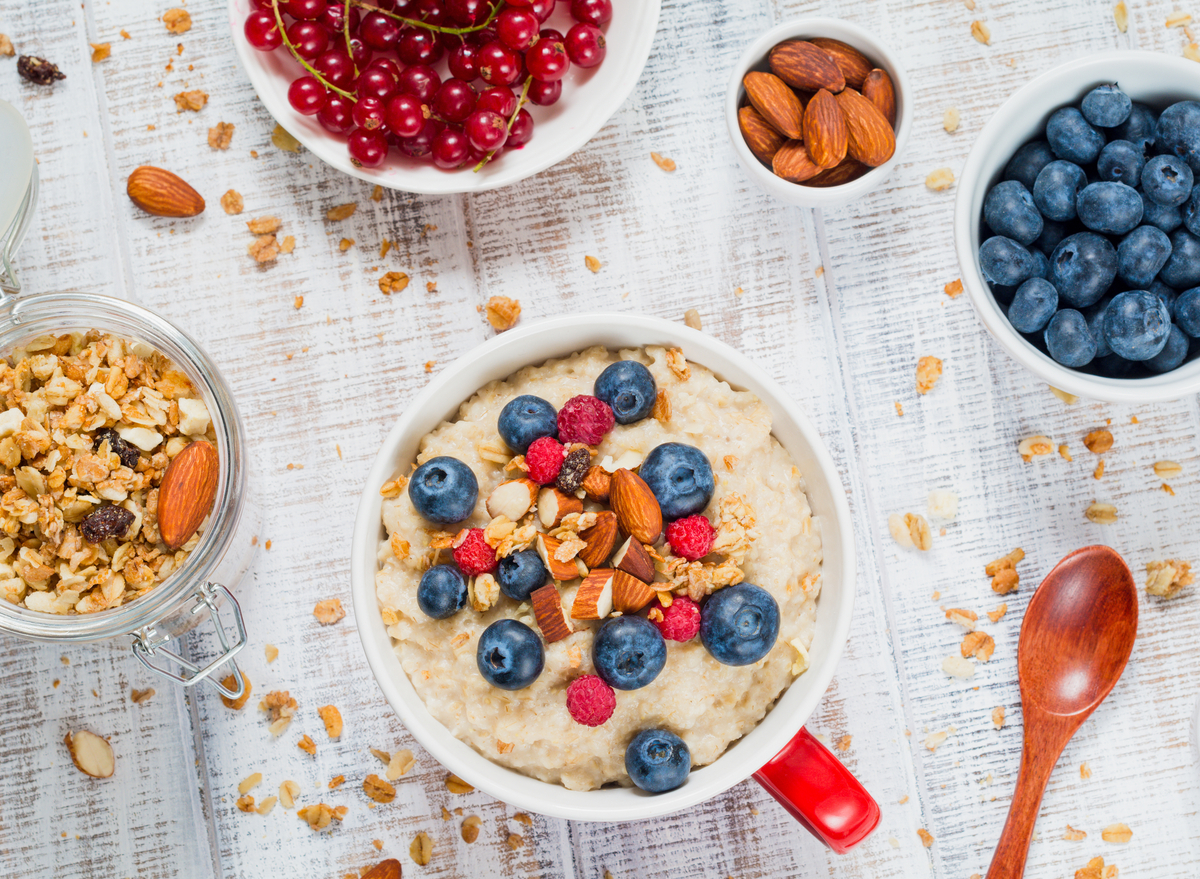
Starting your day with the right kind of breakfast is like suiting up to face a blizzard. It’s about protection from harmful elements. A good breakfast can stoke your immune system to optimize your natural defenses against infection, including fighting viruses that cause respiratory illnesses like the common cold, flu, and even COVID-19.
Deciding what to eat for breakfast to support your body’s immune response should be as easy as choosing between winter boots or flip-flops to wear on a snowy commute. A doughnut will provide about as much support to your immune system as flip-flops will protect your toes from the cold. But there’s more to having an immune-friendly breakfast than knowing what to avoid. In fact, not only is it possible to eat a meal that won’t undercut your infection defenses, but you can actually have one that boosts them even more than normal.
According to Isa Kujawski, MPH, RDN, a functional registered dietitian nutritionist and the founder of Mea Nutrition, the best immune-system-boosting breakfast doesn’t have to be complicated, but it should have some key ingredients such as oats, nuts and seeds, blueberries, and cinnamon with a side of green tea. Here’s how to build an infection-fighting breakfast you can eat every day, and for more on how to eat healthy, read about why you shouldn’t waste your money on These Popular Immunity Supplements That Don’t Work, say Experts.
The Base: Oatmeal
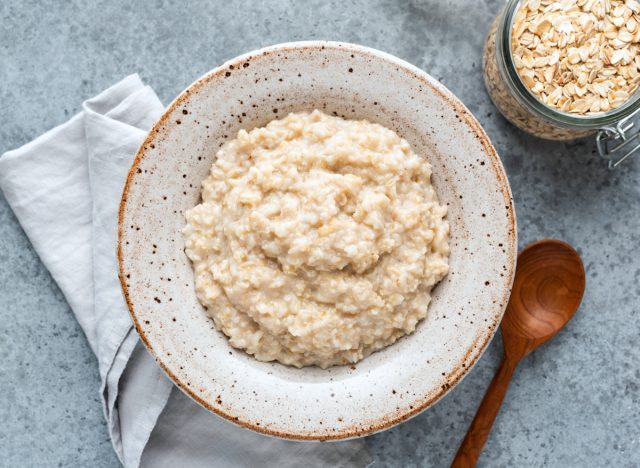
“A good portion of our immune system—around 70 percent—is located in the gut and is largely dependent on the health of our gut microbiota,” says Kujawski. “The dietary fiber in foods like oats feed friendly gut bacteria, which support the immune system and can also keep bad bacteria in check. The complex carbohydrates in oats also provide a steady source of slow-burning fuel for the morning to power your day and keep you feeling full,” she adds. Choose plain oatmeal as you based since flavored oatmeal is typically loaded with added sugars.
The B-Cell Boosters: Nuts & Seeds
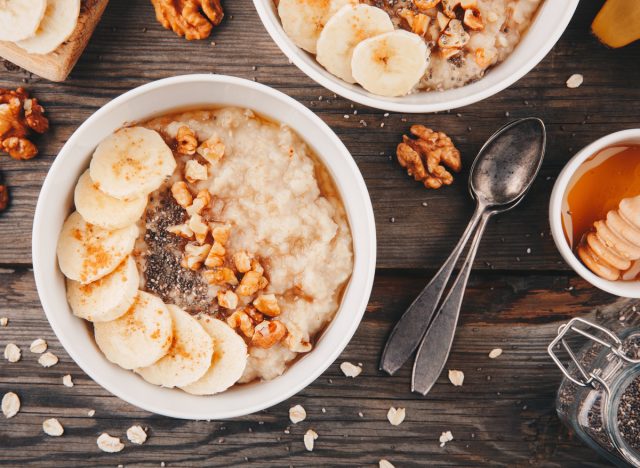
Top that oatmeal with pumpkin seeds, walnuts, or chia seeds. Nuts and seeds like these are good sources of micronutrients such as iron, zinc, and magnesium which all play a central role in immunity, says Kujawski. Studies indicate that iron and zinc, for example, are critical to the development of lymphocytes called B-cells, the “special ops” unit of immune system defense that produces the antibodies that fight bacteria and viruses.
Loading up on the magnesium is a good move, too, because the mineral activates vitamin D in the body to strengthen the immune system. A study by researchers at Saint Luke’s Mid America Heart Institute in Kansas City suggests that increasing levels of magnesium and vitamin D may even help COVID-19 sufferers fight off the virus.
Another reason to squirrel away nuts and seeds to bulk up your oatmeal: their healthy fats can keep blood sugar stable. “Keeping blood sugar under control is important, as excess sugar can disrupt the immune system, especially when blood sugar is chronically high,” says Kujawski. As a bonus, starting the day with stable blood sugar may decrease the likelihood of craving sugary snacks later in the day, which can cause weight gain. Read this to learn about The #1 Snack to Live Longer.
Blueberries: The Sweetness
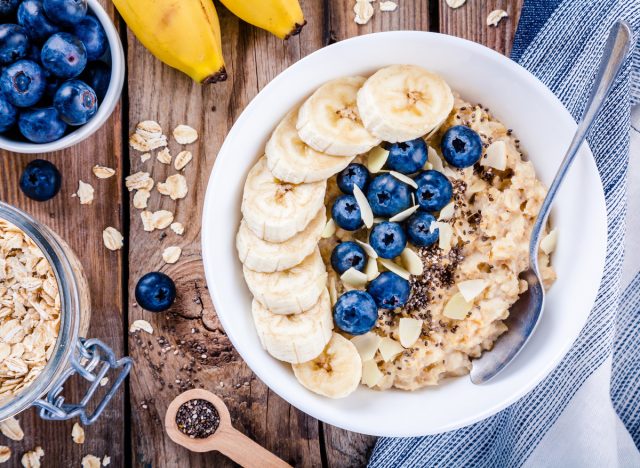
Oats and nuts make for a pretty earthy-tasting breakfast, but you can sweeten it up naturally by adding fruit. The dietitian sweetens her oatmeal with blueberries, a powerhouse fruit loaded with immune-boosting antioxidants, including that famed illness defender vitamin C. Several studies like one in Nutrition Journal have ranked blueberries as having exceptionally high levels of antioxidants, compounds that protect your cells from damage by molecules known as free radicals.
Cinnamon: The Spice
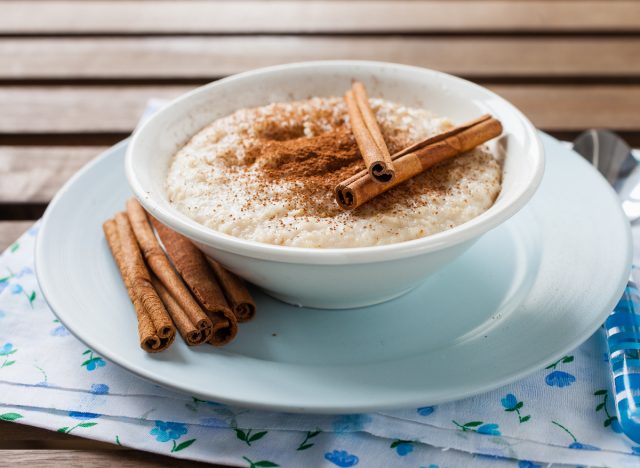
Just a sprinkle or two elevates humble oatmeal to another palate-pleasing level. But it does more. “Cinnamon has been shown to contain anti-inflammatory properties and also helps lower blood sugar,” says Kujawski. In fact, a review of studies on cinnamon in the journal Pharmacognosy Research outlined the many ways the spice may protect the body, including by limiting Alzheimer’s-induced changes in the brain, reducing oxidative stress in the liver, boosting cardio-protective nitric oxide, and lowering blood pressure and cholesterol.
Drink this!
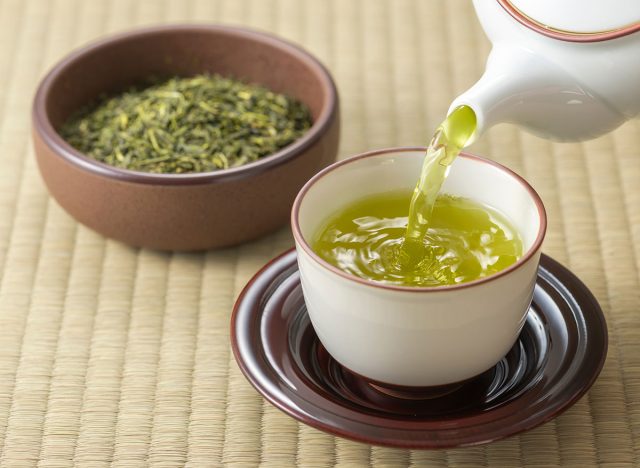
Wash down that immune-strengthening breakfast you’ve just built with a large mug of green tea. “Green tea is filled with compounds containing antioxidant, antimicrobial, and anti-inflammatory properties,” says Kujawski. “They fight infectious agents by increasing beneficial immune cells.”
Hey, but what if…?
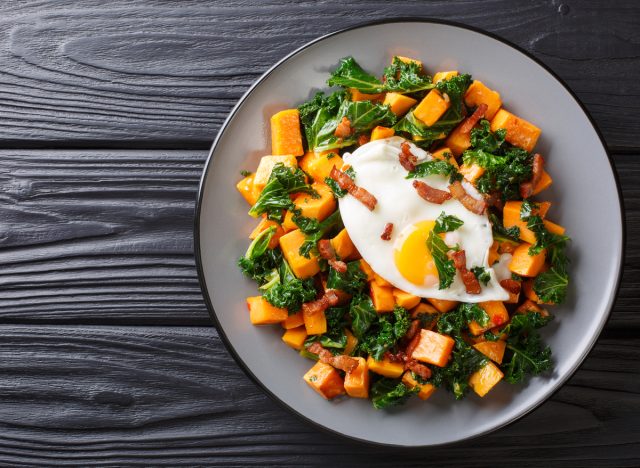
What if you’re the kind of person who’s turned off by the texture of oatmeal or prefers a more savory breakfast? Kujawski suggests whipping up a sweet potato and egg hash sauteed with colorful vegetables like spinach, red bell pepper, garlic, and mushrooms. Just like that power oatmeal, this savory meal will deliver a bountiful mix of complex carbs, fiber, protein, and fats to provide a steady stream of fuel while keeping blood sugar at bay.
The sweet potato is a rich source of beta carotene, which is known to enhance immune function. The spinach contains antioxidants as well as vitamins C and E which support the immune system, while garlic is often touted for its antibiotic properties. Mushrooms have been reported to contain antimicrobial and anti-inflammatory properties. “One thing to keep in mind,” says Kujawski, “the health benefits of garlic may be degraded by cooking, so it’s best to add it at the end of cooking for some additional flavor.”
Read these next:

